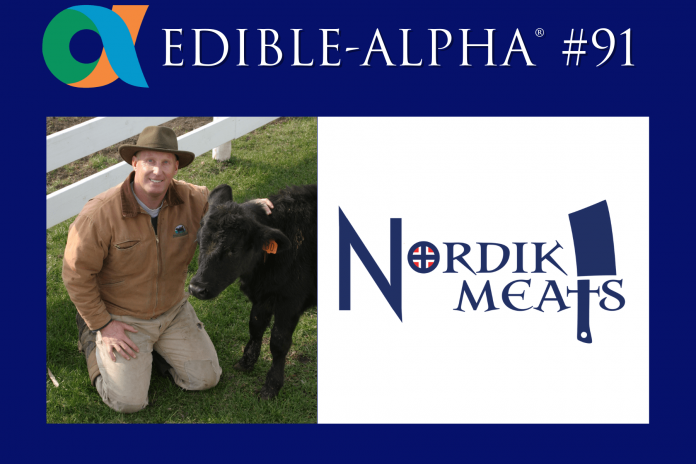
Subscribe: Apple Podcasts | Google Podcasts | Spotify | Email | TuneIn | RSS | More
In Edible-Alpha® podcast #91, Tera talks to Rod Ofte, a fourth-generation farmer and wearer of many hats, whose latest venture is a small USDA-inspected meat-processing plant outside Viroqua, Wisconsin. Nordik Meats opened last July, right in the thick of the COVID-19 pandemic. Rod and Tera discuss the business’s wild first year plus the state of local meat processing nationwide.
Like a lot of farm kids, Rod initially didn’t want anything to do with agriculture. He went to West Point, worked for Mars in Germany for 14 years and traveled the world. But when it came time to start a family, he and his wife moved back to southwestern Wisconsin, bought a farm and began raising grass-fed beef. Next, Rod started a food and beverage consultancy and became general manager of the Wisconsin Grass-fed Beef Cooperative (WGBC), owner of the Wisconsin Meadows brand.
Through these experiences, Rod grew frustrated by the dwindling availability of local meat processing for small producers and co-ops. He wanted to help reduce farmers’ pain—and costs—by getting involved with processing in the Driftless Region of Wisconsin, but capital constraints held him back. Finally, in December 2019, Rod and a few other WGBC members and partners purchased the shuttered Driftless Meats plant.
With a closing date set for April 1, 2020, the partners began due diligence. By March, COVID-19 was storming the nation, upending the food supply chain and exacerbating longstanding issues in the meat business. Suddenly, processors were in higher demand than ever. Nordik began booking appointments in advance, smartly requiring a reservation deposit, which provided capital for building up the facility, website and other infrastructure. Upon opening July 1, the plant was booked solid nine months out.
Nordik Meats handles hogs, lamb, sheep, goats and some beef and offers slaughter, cutting and value-added production. Demand for appointments has since cooled, just as it has for most meat processors. But as Rod tells Tera, the pandemic-spawned demand had been overblown, primarily a product of ranchers overbooking slots for fear they wouldn’t find processing when they needed it.
Next, they discuss the seasonality of the business, which poses challenges—i.e., maintaining revenue, retaining skilled workers—for meat processors everywhere. Rod then gives his take on how the pandemic has impacted consumer behavior and buying patterns, such as more home-cooking, increased demand for local meat and greater acceptance of cuts once deemed less desirable, and whether these trends will last.
Finally, Tera and Rod talk about the problems with meat processing, which largely stem from massive corporate consolidation and the many obstacles faced by small players and potential new entrants. Yet despite these challenges, Rod believes it’s possible for small-scale meat processing to reemerge a la the current microbrewery renaissance. In closing, he offers sage advice for food and ag entrepreneurs looking to tackle this space.


